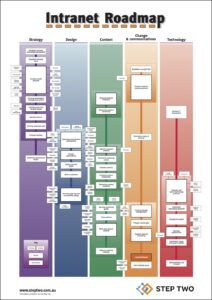
Filed under: Articles, Intranets
While intranets often have someone appointed as the intranet ‘manager’, do they spend their time actually managing the site, or publishing pages?
Observing many organisations and intranets, one of the critical success factors is to have an intranet manager who is free to focus solely on the management of the site. The intranet manager should not be publishing pages or working on the technology platform.
Establishing an intranet team
An intranet ‘team’ of one is not enough, unless the organisation (or intranet) is very small. In the earlier article Roles needed in an intranet team, a very wide range of skills and responsibilities were identified for a successful team.
In practice, this means that an intranet team will need to consist of an overall ‘manager’ (or ‘coordinator’), along with several staff to do the actual day-to-day work on the site.
Even then, the intranet team will have to collaborate very closely with other areas of the organisation to ensure that necessary skills can be obtained when needed.
Activities of the intranet manager
The intranet manager role should focus solely on the management of the site, including overall strategy and planning, and coordination with other areas of the business.
As highlighted in the article Intranet teams: a leadership and coaching role, the success of the intranet as a whole is determined (to a large extent) by the leadership of the intranet team.
This leadership is provided most strongly by the intranet manager, and it is their responsibility to ensure that the intranet is driven forward as a strategic business tool.
The coordination of the many intranet stakeholders is, in itself, almost a full-time role. It is also where the greatest benefits can be realised.
The intranet manager should therefore be:
- creating the overall vision and metrics
- developing strategic and tactical plans for the intranet
- prioritising intranet development activities
- project managing the intranet team
- acting as liaison between the intranet team and the intranet sponsor
- managing the relationship of the intranet team with other key business areas
- coordinating and managing the interests of all intranet stakeholders
- acting as the single point of contact for the intranet
- managing the communications activities of the intranet team
- ensuring visibility of the intranet at management and executive levels
- obtaining and managing intranet resources (including budgets)
- reporting on intranet status and successes to the intranet sponsor (and others)
What they shouldn’t be doing
The intranet manager should not be:
- publishing web pages
- reviewing or rewriting content
- directly managing the intranet technology platform
- conducting development (coding) activities
- designing site appearance or structure
A full time role
The list of responsibilities for an intranet manager is not short. In practice, this means that the intranet manager role is likely to be a full-time one, whenever an organisation grows beyond 500 or more staff.
The value of establishing this full-time role has been demonstrated across many organisations. The more resources that are allocated to planning and growing the intranet, the more successful the site will be, and the greater the business benefits reaped. Establishing anything less than a full-time intranet manager role would be a false economy.





